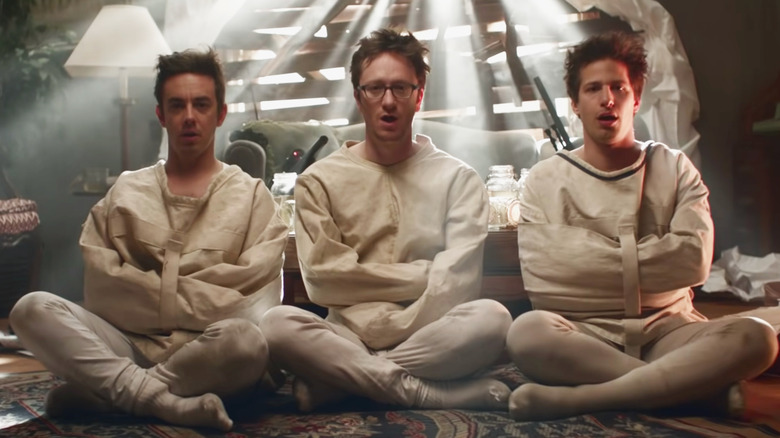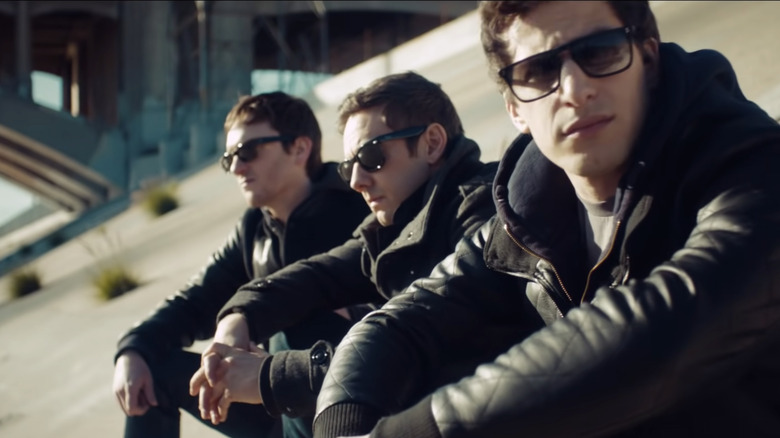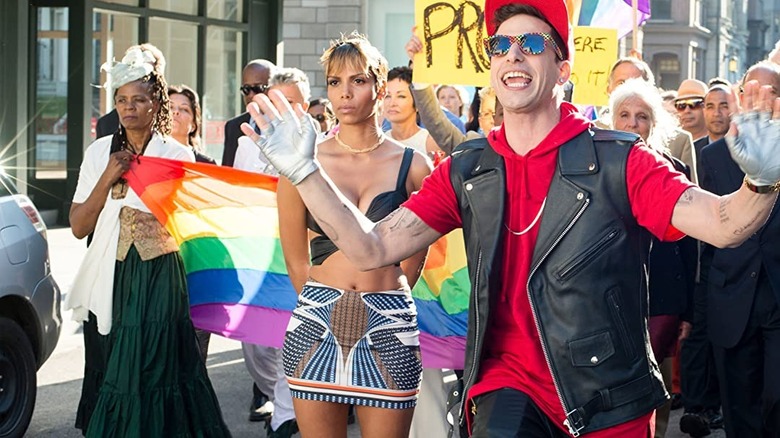The Lonely Island's Filmmaking Style Comes From One Very Relatable Desire
Chances are, if you're between the ages of twenty and forty, you've been a fan of The Lonely Island at some point in your life. Long time creative collaborators Andy Samberg, Jorm Taccone, and Akiva Schaffer have been working together since 2001 when they released their first comedic rap song, "Ka-Blamo." After years of making digital shorts online and eventually for Saturday Night Live, the team moved into directing and starring in feature films like "Hot Rod" (2007) and, most recently, the animated comedy "Chip 'n Dale: Rescue Rangers" (2022). Throughout their entire career, the team has been guided by a single mantra that has dictated every choice from their first project onward.
Even in their earliest work, the musical comedy group presented a very distinct filmmaking style that made them stand out. They used the resources available to them in the emerging digital world to approach humor from new angles, like flashing titles in "Lazy Sunday" and low-budget effects in "Laser Cats." Samberg credits this creative genius to Schaffer in an interview with Collider.
"... all of our earliest trademarks were very much Akiva's directorial perspective. I would say we all had the same reference points and touchstones of things we loved and what we wanted to be making, and he was the one that just got down to it, and self-taught himself all the programs."
... Trying not to be embarrassing
Schaffer had a specific thesis that guided much of his directorial efforts, Samberg added. The comedian recollects that Schaffer would make decisions about lighting and editing in order to prevent the finished product from being "embarrassing." "Everything was born of... not wanting to be embarrassed about what we were making," Samberg explained. Taccone chimed in to say "that mantra still stands today."
Using this "mantra" as a guide, Schaffer used cinematic techniques to imbue their projects with additional humor. This laid the groundwork for major hits like "D**k in a Box," which featured pop sensation Justin Timberlake at a high point in his career. The comedians and the musician found a kinship in a "shared affection slash ironic love" for early '90s R&B, Samberg said (via Behind the Digital Shorts). A major source of comedy in the video is the creators' understanding of the genre that they are parodying, down to emulating camera angles and transitions. This can also be found in earlier sketches like "Lazy Sunday," which borrows fisheye lens shots, jump-cuts, and editing beats from '90s music videos like The Beastie Boys' "Intergalactic" (1998).
Collaborators had to match their humor
When The Lonely Island started to branch out into higher budget productions, they needed to bring people on board that could execute their vision with the same creative and comedic perspective. Enter Brandon Trost, the cinematographer for "Popstar: Never Stop Never Stopping," a 2016 parody of Justin Bieber's "Never Say Never" that The Lonely Island directed and starred in. Trost first worked with Taccone on "MacGruber," the comedian's directorial debut. Taccone testifies that Trost "has a great sense of humor" and that the two were "totally like-minded" (via Collider). The cinematographer primarily worked in action and horror and never shot a comedy before. Taccone wanted Trost to shoot "MacGruber" specifically because he "wasn't a comedy DP," the cinematographer told Miami New Times. Taccone wanted the texture of the film to resemble the '80s action movies it was parodying as closely as possible. Trost's experience allowed him to shoot the film in the same style that he shot films like "Crank 2: High Voltage." Trost says that this direction "informed my approach for all of the different comedies I did after."
Every member of The Lonely Island, particularly Schaffer and Taccone, understands that the best way to avoid making comedy embarrassing is to make thoughtful choices in directing, shooting, and editing. Through imbuing every facet of their projects with their humor, The Lonely Island has developed a distinctive and unforgettable style that extends across genres from music videos to animated features.


